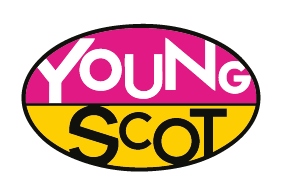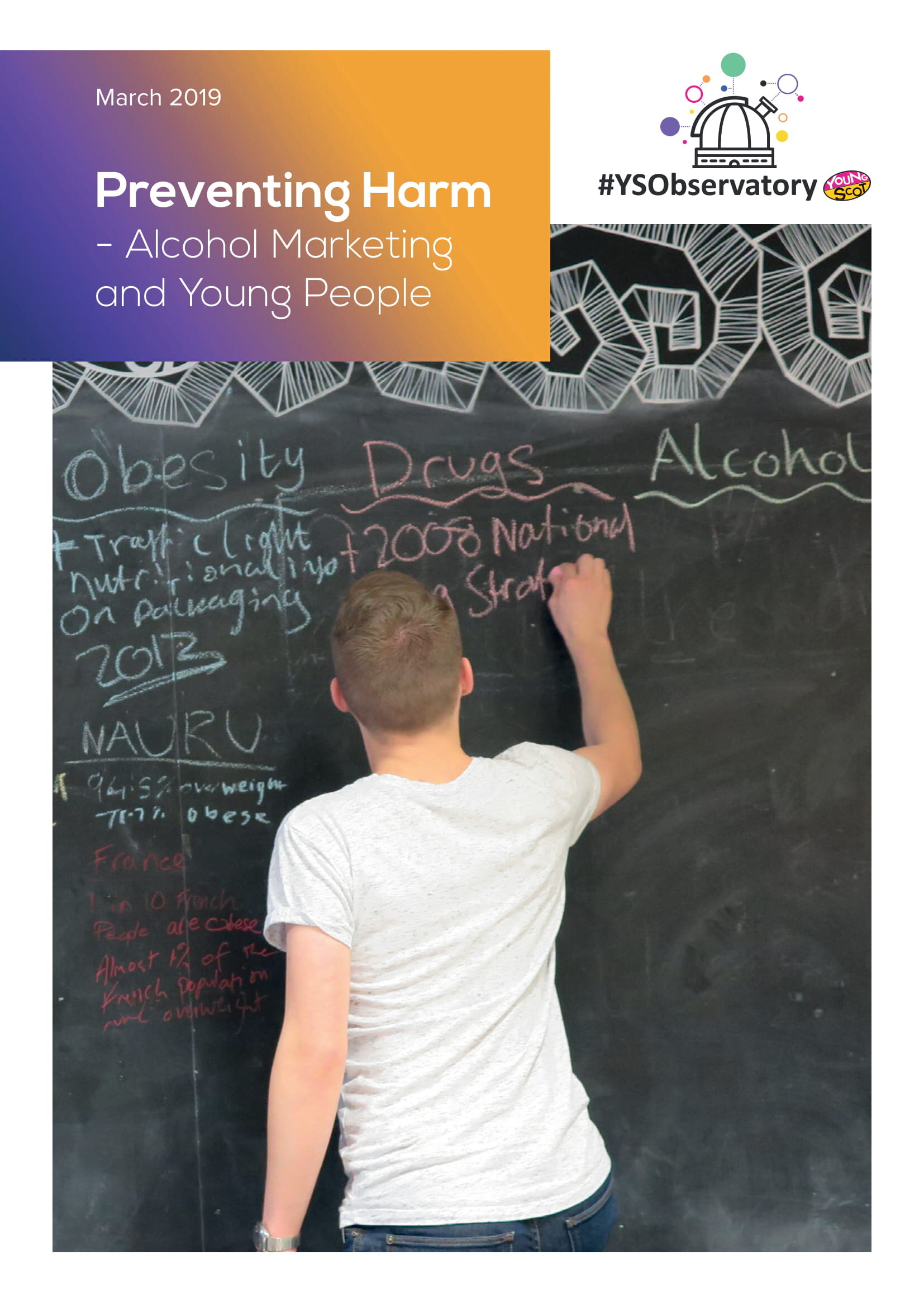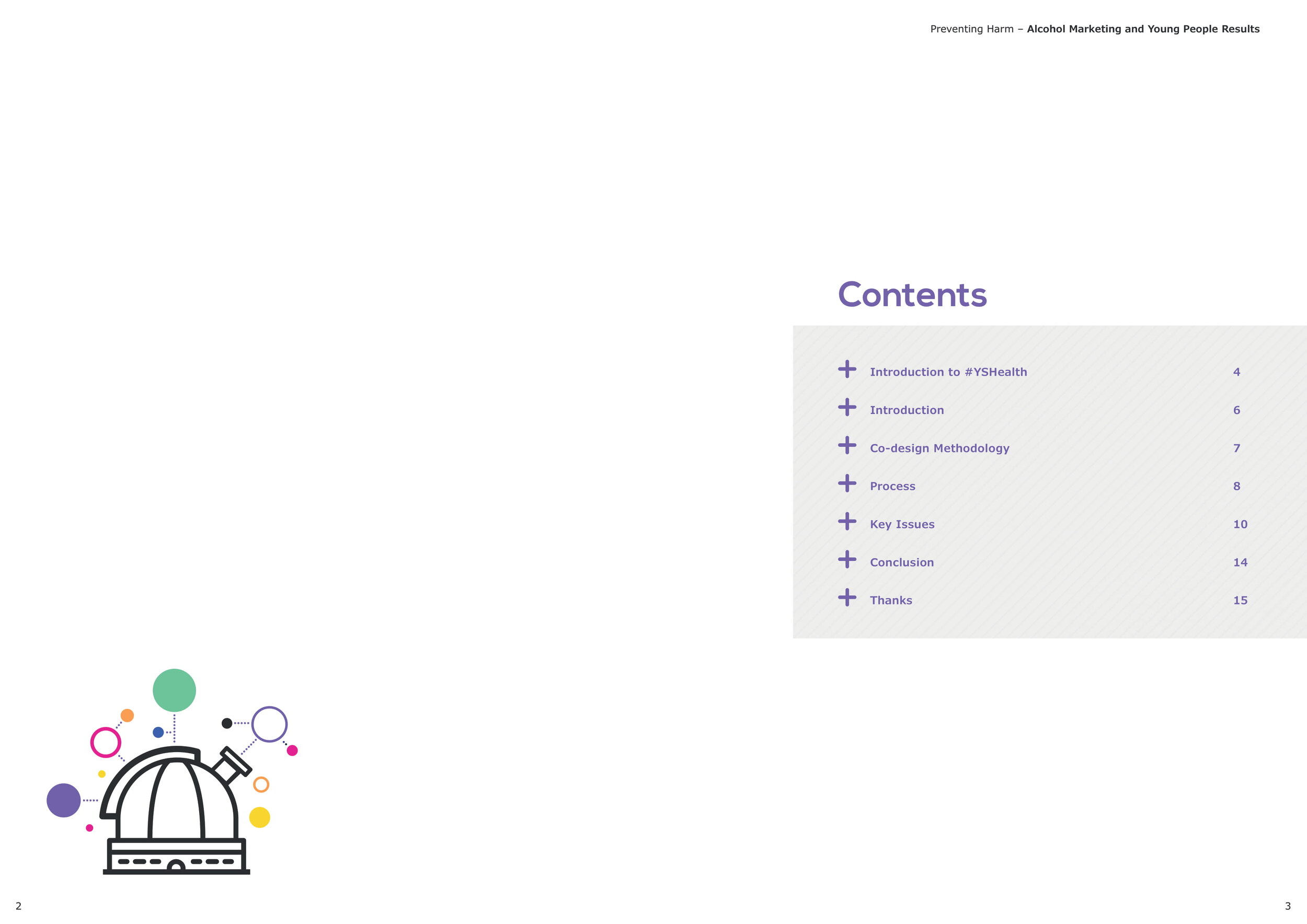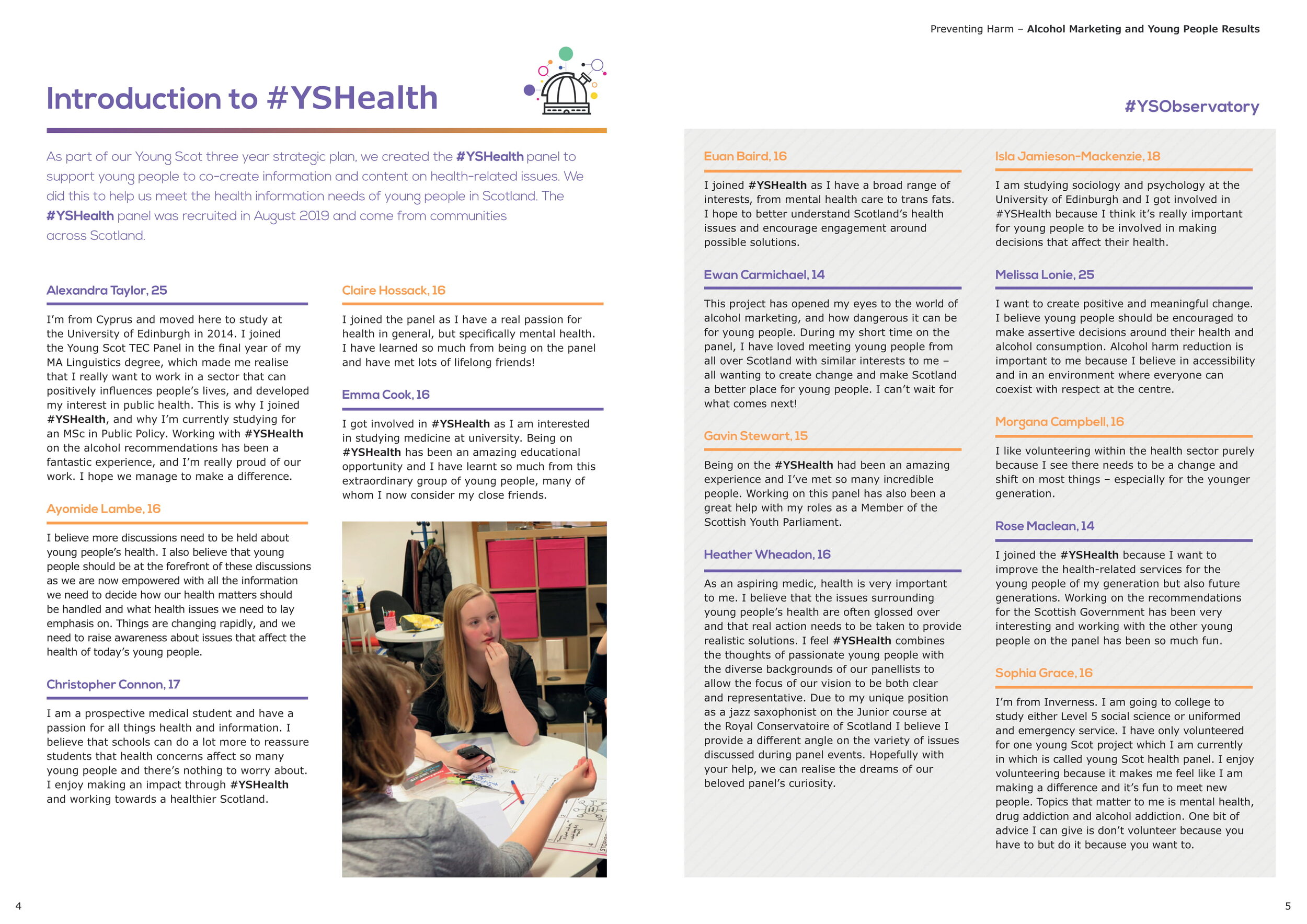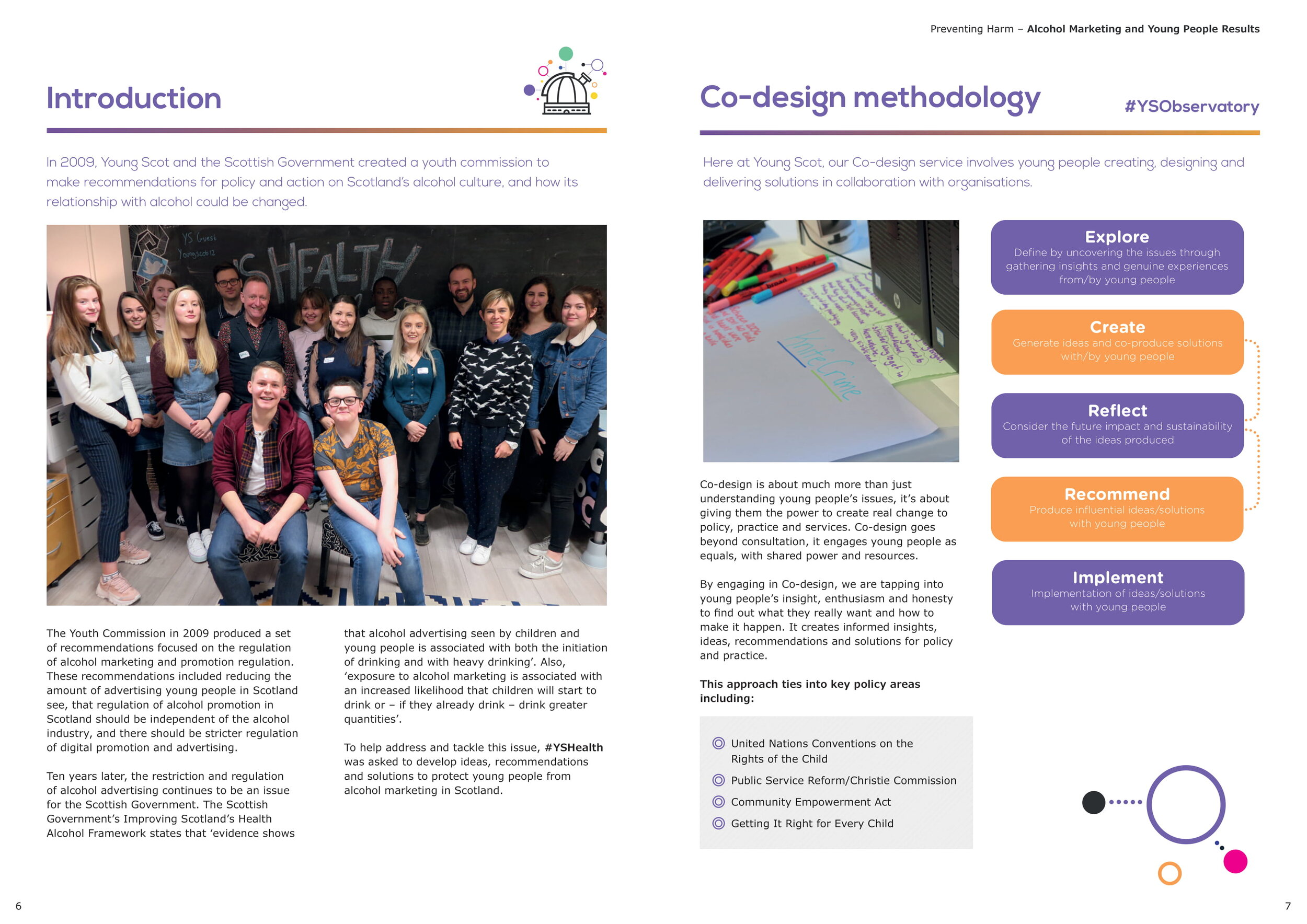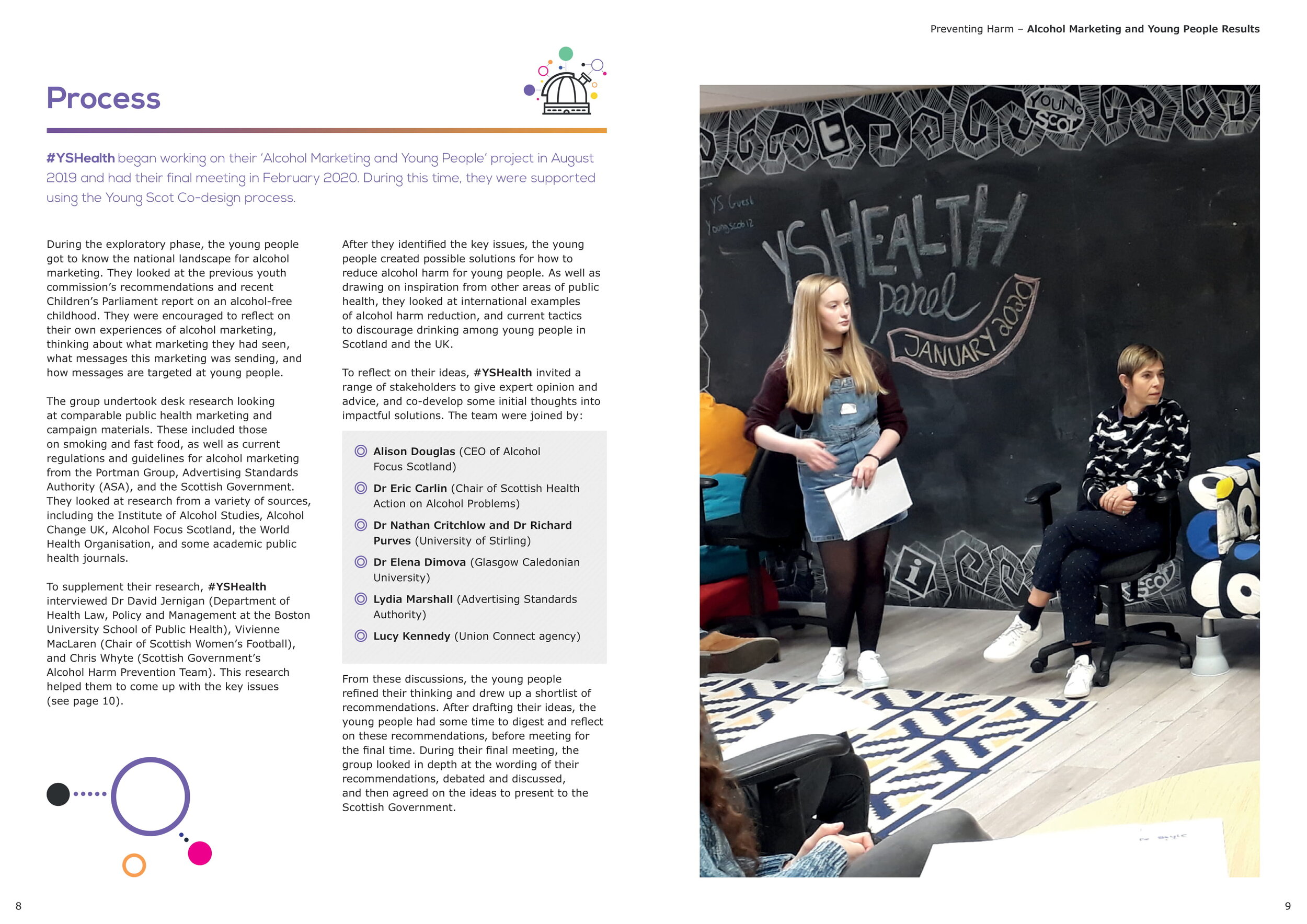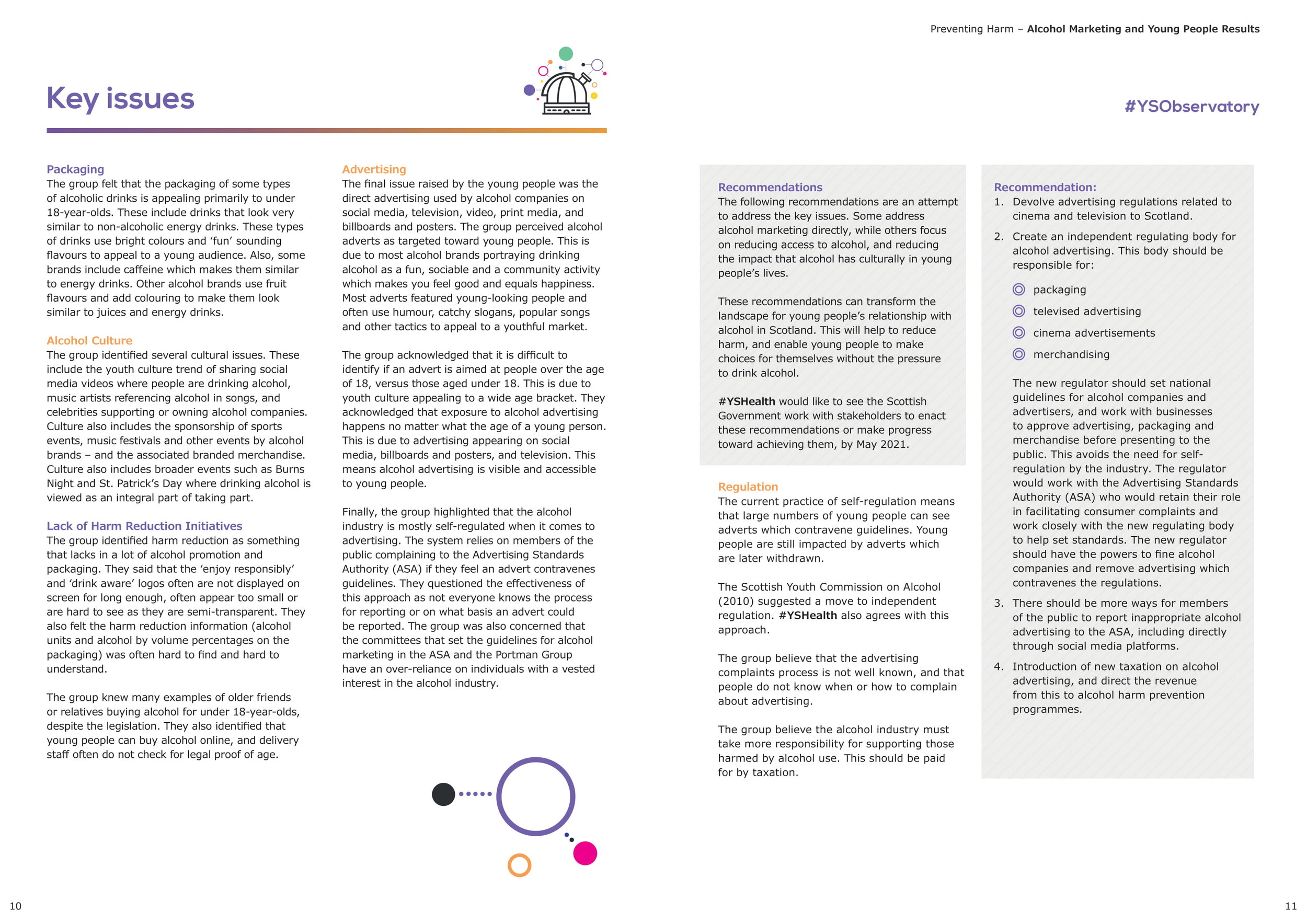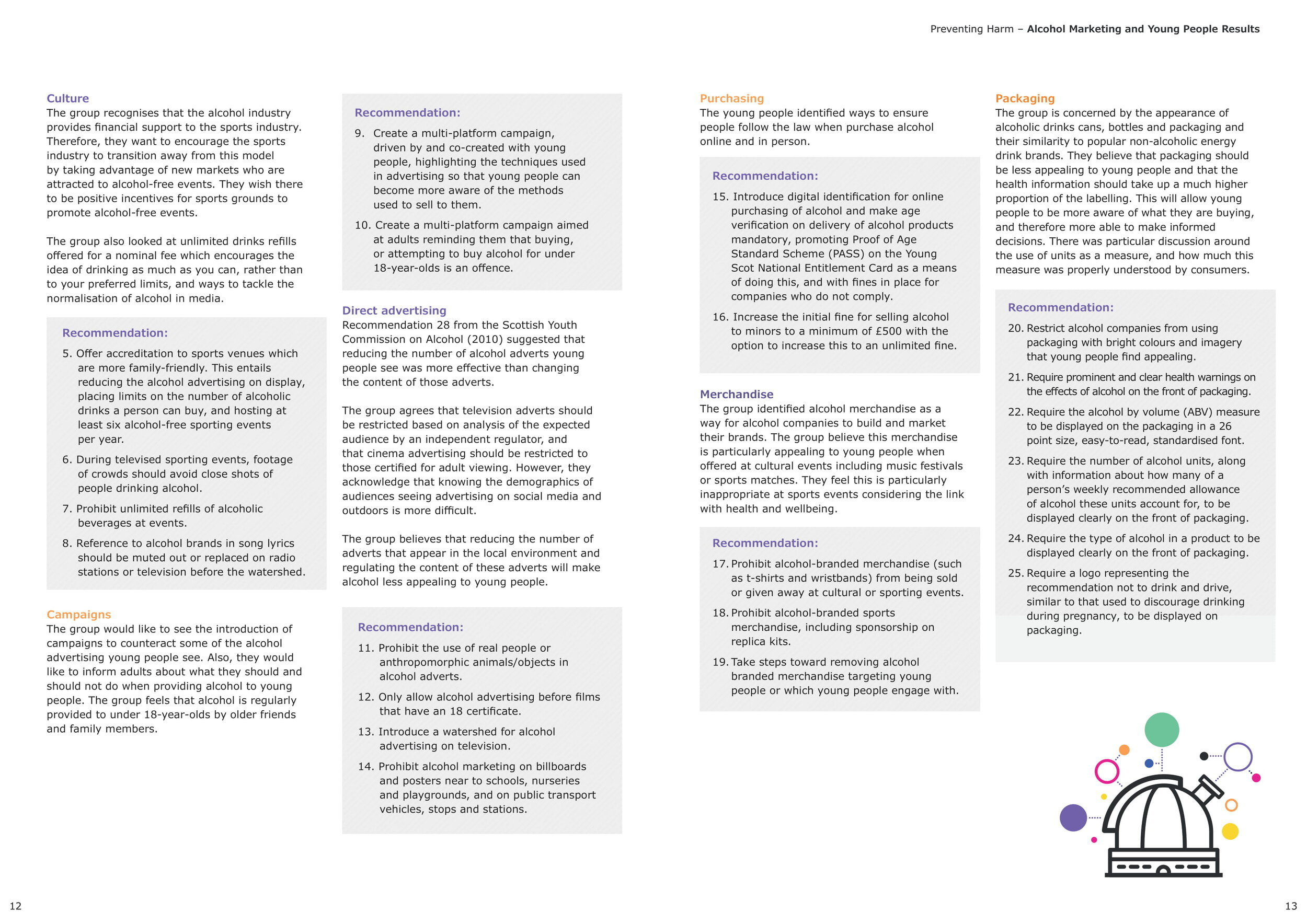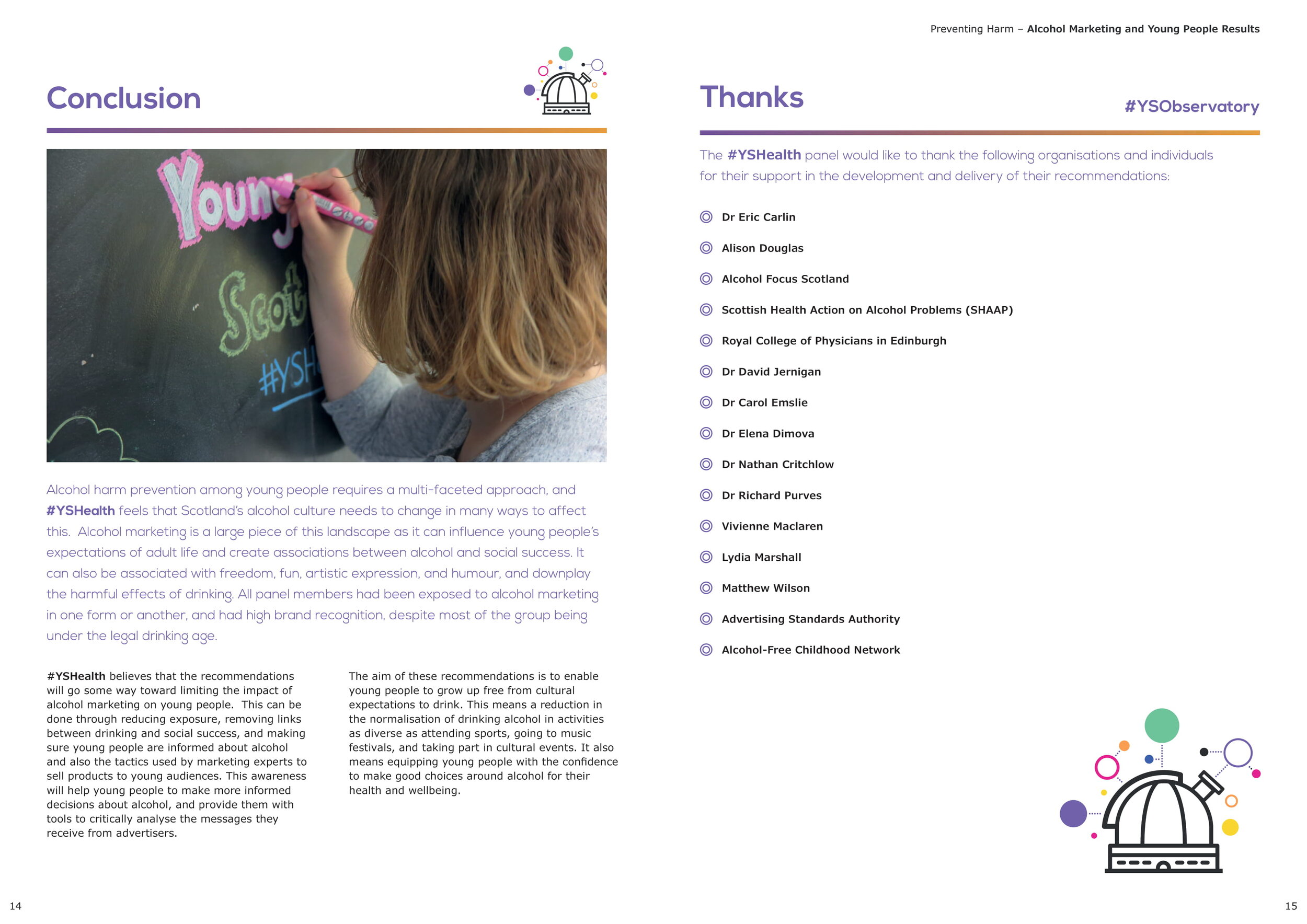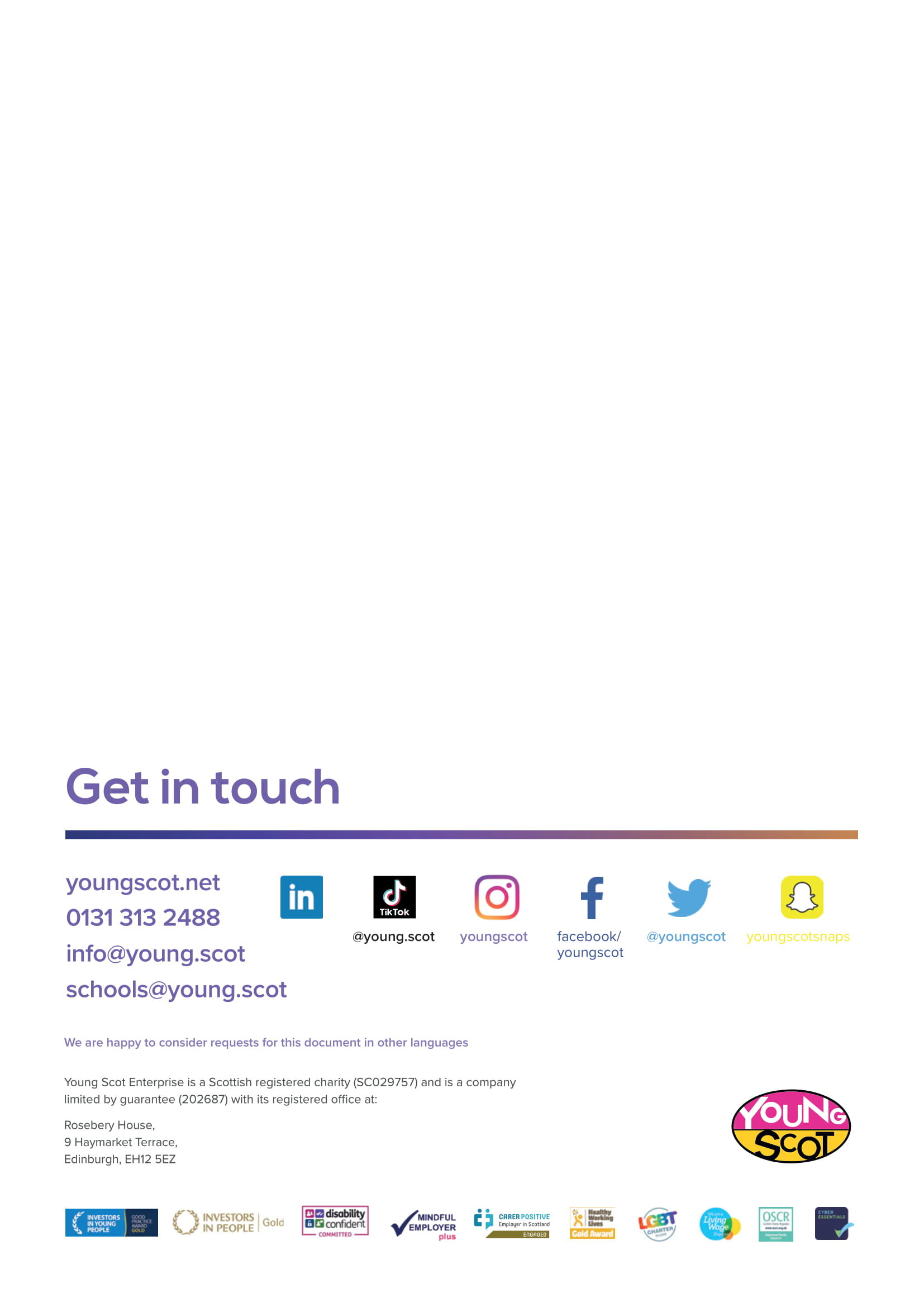Preventing Harm - Alcohol Marketing and Young People
The Scottish Government asked our #YSHealth panel of volunteers to develop ideas, recommendations and solutions to protect young people from alcohol marketing in Scotland. Our volunteers presented their findings and recommendations to Ministers Maree Todd MSP and Joe FitzPatrick MSP.
This project followed the publication in 2009 of recommendations from a Young Scot Youth Commission on Scotland’s alcohol culture.
Delivery
#YSHealth is a panel of young people who co-create information content to ensure we are meeting the health information needs of young people from across Scotland. The young people kicked-off the project by getting to know the national landscape for alcohol marketing as well as reflecting on their own experiences of alcohol marketing.
As part of their research, the young people thought about what alcohol marketing they had seen, what messages this marketing was sending, and how messages are targeted at young people. They also interviewed experts, including Dr David Jernigan (Boston University), Vivienne MacLaren (Scottish Women’s Football), and and Lydia Marshall (Advertising Standards Authority).
Their research helped them to identify key issues:
Packaging
Alcohol culture
Lack of harm reduction initiatives
Advertising
Recommendations
Following their research, the young people created recommendations to reduced the harm of alcohol advertising. These recommendations are designed to transform the landscape for young people’s relationship with alcohol in Scotland. They will help to reduce harm, and enable young people to make choices for themselves without the pressure to drink alcohol. The recommendations include:
Create an independent regulating body for alcohol advertising.
Devolve power to regulate TV and cinema advertising to the Scottish Government.
Only allow alcohol advertising before films that have an 18 certificate.
Introduce a watershed for alcohol advertising on television.
Prohibit alcohol marketing on billboards and posters near to schools, nurseries and playgrounds, and on public transport vehicles, stops and stations.
Stop using real people or human-like figures in alcohol advertising.
Offer accreditation to sports ‘Family Friendly’ venues that reduce alcohol advertising on display, limit the number of alcoholic drinks a person can buy, and hosting a number of alcohol-free events per year.
Stop the sale or giveaways of alcohol-branded merchandise (such as t-shirts and wristbands) at cultural or sporting events.
Restrict alcohol brands from using packaging with bright colours and imagery that young people find appealing.
Require prominent and clear health warnings on the effects of alcohol on the front of packaging.
Run a campaign, co-created with young people, to make young people aware of the advertising techniques used to target them.
Introduce digital identification for online alcohol purchases and make age verification on delivery of alcohol products mandatory.
Promote the Proof of Age Standard Scheme on the Young Scot National Entitlement Card as a way to verify age, fines those who don’t comply.
You can preview or download a PDF version of the full report, or view a text only version below.
Plain Text Version
Introduction to #YSHealth
As part of our Young Scot three year strategic plan, we created the #YSHealth panel to support young people to co-create information and content on health-related issues. We did this to help us meet the health information needs of young people in Scotland. The
#YSHealth panel was recruited in August 2019 and come from communities across Scotland.
Euan Baird, 16
I joined #YSHealth as I have a broad range of interests, from mental health care to trans fats. I hope to better understand Scotland’s health issues and encourage engagement around possible solutions.
Isla Jamieson-Mackenzie, 18
I am studying sociology and psychology at the
University of Edinburgh and I got involved in
#YSHealth because I think it’s really important for young people to be involved in making decisions that affect their health.
Alexandra Taylor, 25
I’m from Cyprus and moved here to study at the University of Edinburgh in 2014. I joined
the Young Scot TEC Panel in the final year of my MA Linguistics degree, which made me realise that I really want to work in a sector that can
positively influences people’s lives, and developed
my interest in public health. This is why I joined
#YSHealth, and why I’m currently studying for an MSc in Public Policy. Working with #YSHealth on the alcohol recommendations has been a fantastic experience, and I’m really proud of our work. I hope we manage to make a difference.
Ayomide Lambe, 16
I believe more discussions need to be held about young people’s health. I also believe that young people should be at the forefront of these discussions as we are now empowered with all the information
we need to decide how our health matters should be handled and what health issues we need to lay emphasis on. Things are changing rapidly, and we need to raise awareness about issues that affect the health of today’s young people.
Christopher Connon, 17
I am a prospective medical student and have a passion for all things health and information. I believe that schools can do a lot more to reassure students that health concerns affect so many young people and there’s nothing to worry about. I enjoy making an impact through #YSHealth
and working towards a healthier Scotland.
Claire Hossack, 16
I joined the panel as I have a real passion for health in general, but specifically mental health. I have learned so much from being on the panel and have met lots of lifelong friends!
Emma Cook, 16
I got involved in #YSHealth as I am interested in studying medicine at university. Being on
#YSHealth has been an amazing educational opportunity and I have learnt so much from this extraordinary group of young people, many of whom I now consider my close friends.
Ewan Carmichael, 14
This project has opened my eyes to the world of alcohol marketing, and how dangerous it can be for young people. During my short time on the panel, I have loved meeting young people from all over Scotland with similar interests to me – all wanting to create change and make Scotland a better place for young people. I can’t wait for what comes next!
Gavin Stewart, 15
Being on the #YSHealth had been an amazing experience and I’ve met so many incredible people. Working on this panel has also been a great help with my roles as a Member of the Scottish Youth Parliament.
Heather Wheadon, 16
As an aspiring medic, health is very important to me. I believe that the issues surrounding young people’s health are often glossed over
and that real action needs to be taken to provide realistic solutions. I feel #YSHealth combines
the thoughts of passionate young people with the diverse backgrounds of our panellists to allow the focus of our vision to be both clear and representative. Due to my unique position as a jazz saxophonist on the Junior course at the Royal Conservatoire of Scotland I believe I
provide a different angle on the variety of issues discussed during panel events. Hopefully with your help, we can realise the dreams of our beloved panel’s curiosity.
Melissa Lonie, 25
I want to create positive and meaningful change. I believe young people should be encouraged to make assertive decisions around their health and alcohol consumption. Alcohol harm reduction is important to me because I believe in accessibility and in an environment where everyone can coexist with respect at the centre.
Morgana Campbell, 16
I like volunteering within the health sector purely because I see there needs to be a change and shift on most things – especially for the younger generation.
Rose Maclean, 14
I joined the #YSHealth because I want to improve the health-related services for the young people of my generation but also future generations. Working on the recommendations for the Scottish Government has been very interesting and working with the other young people on the panel has been so much fun.
Sophia Grace, 16
I’m from Inverness. I am going to college to study either Level 5 social science or uniformed and emergency service. I have only volunteered for one young Scot project which I am currently
in which is called young Scot health panel. I enjoy volunteering because it makes me feel like I am making a difference and it’s fun to meet new people. Topics that matter to me is mental health, drug addiction and alcohol addiction. One bit of advice I can give is don’t volunteer because you have to but do it because you want to.
Introduction
Co-design methodology
In 2009, Young Scot and the Scottish Government created a youth commission to make recommendations for policy and action on Scotland’s alcohol culture, and how its relationship with alcohol could be changed.
Here at Young Scot, our Co-design service involves young people creating, designing and delivering solutions in collaboration with organisations.
The Youth Commission in 2009 produced a set of recommendations focused on the regulation of alcohol marketing and promotion regulation. These recommendations included reducing the amount of advertising young people in Scotland see, that regulation of alcohol promotion in Scotland should be independent of the alcohol industry, and there should be stricter regulation of digital promotion and advertising.
Ten years later, the restriction and regulation of alcohol advertising continues to be an issue for the Scottish Government. The Scottish Government’s Improving Scotland’s Health Alcohol Framework states that ‘evidence shows that alcohol advertising seen by children and young people is associated with both the initiation of drinking and with heavy drinking’. Also, ‘exposure to alcohol marketing is associated with an increased likelihood that children will start to drink or – if they already drink – drink greater quantities’.
To help address and tackle this issue, #YSHealth was asked to develop ideas, recommendations and solutions to protect young people from alcohol marketing in Scotland.
Co-design is about much more than just understanding young people’s issues, it’s about giving them the power to create real change to policy, practice and services. Co-design goes beyond consultation, it engages young people as equals, with shared power and resources.
By engaging in Co-design, we are tapping into young people’s insight, enthusiasm and honesty to find out what they really want and how to make it happen. It creates informed insights, ideas, recommendations and solutions for policy and practice.
This approach ties into key policy areas including:
United Nations Conventions on the
Rights of the Child
Public Service Reform/Christie Commission
Community Empowerment Act
Getting It Right for Every Child
Explore
Define by uncovering the issues through gathering insights and genuine experiences from/by young people
Create
Generate ideas and co-produce solutions with/by young people
Reflect
Consider the future impact and sustainability of the ideas produced
Recommend
Produce influential ideas/solutions with young people
Implement
Implementation of ideas/solutions with young people
Process
#YSHealth began working on their ‘Alcohol Marketing and Young People’ project in August
2019 and had their final meeting in February 2020. During this time, they were supported using the Young Scot Co-design process.
During the exploratory phase, the young people got to know the national landscape for alcohol marketing. They looked at the previous youth commission’s recommendations and recent Children’s Parliament report on an alcohol-free childhood. They were encouraged to reflect on their own experiences of alcohol marketing, thinking about what marketing they had seen, what messages this marketing was sending, and how messages are targeted at young people.
The group undertook desk research looking at comparable public health marketing and campaign materials. These included those
on smoking and fast food, as well as current regulations and guidelines for alcohol marketing from the Portman Group, Advertising Standards Authority (ASA), and the Scottish Government. They looked at research from a variety of sources, including the Institute of Alcohol Studies, Alcohol Change UK, Alcohol Focus Scotland, the World Health Organisation, and some academic public health journals.
To supplement their research, #YSHealth interviewed Dr David Jernigan (Department of Health Law, Policy and Management at the Boston University School of Public Health), Vivienne MacLaren (Chair of Scottish Women’s Football), and Chris Whyte (Scottish Government’s
Alcohol Harm Prevention Team). This research helped them to come up with the key issues (see page 10).
After they identified the key issues, the young people created possible solutions for how to reduce alcohol harm for young people. As well as drawing on inspiration from other areas of public health, they looked at international examples
of alcohol harm reduction, and current tactics to discourage drinking among young people in Scotland and the UK.
To reflect on their ideas, #YSHealth invited a range of stakeholders to give expert opinion and advice, and co-develop some initial thoughts into impactful solutions. The team were joined by:
Alison Douglas (CEO of Alcohol
Focus Scotland)
Dr Eric Carlin (Chair of Scottish Health
Action on Alcohol Problems)
Dr Nathan Critchlow and Dr Richard
Purves (University of Stirling)
Dr Elena Dimova (Glasgow Caledonian
University)
Lydia Marshall (Advertising Standards
Authority)
Lucy Kennedy (Union Connect agency)
From these discussions, the young people refined their thinking and drew up a shortlist of recommendations. After drafting their ideas, the young people had some time to digest and reflect on these recommendations, before meeting for the final time. During their final meeting, the group looked in depth at the wording of their recommendations, debated and discussed, and then agreed on the ideas to present to the Scottish Government.
Key issues
Packaging
The group felt that the packaging of some types of alcoholic drinks is appealing primarily to under
18-year-olds. These include drinks that look very similar to non-alcoholic energy drinks. These types of drinks use bright colours and ‘fun’ sounding flavours to appeal to a young audience. Also, some brands include caffeine which makes them similar to energy drinks. Other alcohol brands use fruit flavours and add colouring to make them look similar to juices and energy drinks.
Alcohol Culture
The group identified several cultural issues. These include the youth culture trend of sharing social media videos where people are drinking alcohol, music artists referencing alcohol in songs, and celebrities supporting or owning alcohol companies. Culture also includes the sponsorship of sports events, music festivals and other events by alcohol brands – and the associated branded merchandise. Culture also includes broader events such as Burns Night and St. Patrick’s Day where drinking alcohol is viewed as an integral part of taking part.
Lack of Harm Reduction Initiatives
The group identified harm reduction as something that lacks in a lot of alcohol promotion and packaging. They said that the ‘enjoy responsibly’ and ‘drink aware’ logos often are not displayed on screen for long enough, often appear too small or are hard to see as they are semi-transparent. They also felt the harm reduction information (alcohol units and alcohol by volume percentages on the packaging) was often hard to find and hard to understand.
The group knew many examples of older friends
or relatives buying alcohol for under 18-year-olds, despite the legislation. They also identified that young people can buy alcohol online, and delivery staff often do not check for legal proof of age.
Advertising
The final issue raised by the young people was the direct advertising used by alcohol companies on social media, television, video, print media, and billboards and posters. The group perceived alcohol adverts as targeted toward young people. This is due to most alcohol brands portraying drinking alcohol as a fun, sociable and a community activity which makes you feel good and equals happiness. Most adverts featured young-looking people and often use humour, catchy slogans, popular songs and other tactics to appeal to a youthful market.
The group acknowledged that it is difficult to
identify if an advert is aimed at people over the age of 18, versus those aged under 18. This is due to youth culture appealing to a wide age bracket. They acknowledged that exposure to alcohol advertising happens no matter what the age of a young person. This is due to advertising appearing on social
media, billboards and posters, and television. This means alcohol advertising is visible and accessible to young people.
Finally, the group highlighted that the alcohol industry is mostly self-regulated when it comes to advertising. The system relies on members of the public complaining to the Advertising Standards Authority (ASA) if they feel an advert contravenes guidelines. They questioned the effectiveness of this approach as not everyone knows the process for reporting or on what basis an advert could
be reported. The group was also concerned that the committees that set the guidelines for alcohol marketing in the ASA and the Portman Group
have an over-reliance on individuals with a vested interest in the alcohol industry.
Recommendations
The following recommendations are an attempt to address the key issues. Some address
alcohol marketing directly, while others focus on reducing access to alcohol, and reducing the impact that alcohol has culturally in young people’s lives.
These recommendations can transform the landscape for young people’s relationship with alcohol in Scotland. This will help to reduce harm, and enable young people to make choices for themselves without the pressure
to drink alcohol.
#YSHealth would like to see the Scottish Government work with stakeholders to enact these recommendations or make progress toward achieving them, by May 2021.
Regulation
The current practice of self-regulation means that large numbers of young people can see adverts which contravene guidelines. Young people are still impacted by adverts which
are later withdrawn.
The Scottish Youth Commission on Alcohol (2010) suggested a move to independent regulation. #YSHealth also agrees with this approach.
The group believe that the advertising complaints process is not well known, and that people do not know when or how to complain about advertising.
The group believe the alcohol industry must take more responsibility for supporting those harmed by alcohol use. This should be paid for by taxation.
Recommendation:
1. Devolve advertising regulations related to cinema and television to Scotland.
2. Create an independent regulating body for alcohol advertising. This body should be responsible for:
packaging
televised advertising cinema advertisements merchandising
The new regulator should set national guidelines for alcohol companies and advertisers, and work with businesses to approve advertising, packaging and merchandise before presenting to the public. This avoids the need for self-
regulation by the industry. The regulator would work with the Advertising Standards Authority (ASA) who would retain their role in facilitating consumer complaints and work closely with the new regulating body to help set standards. The new regulator should have the powers to fine alcohol companies and remove advertising which contravenes the regulations.
3. There should be more ways for members
of the public to report inappropriate alcohol advertising to the ASA, including directly through social media platforms.
4. Introduction of new taxation on alcohol advertising, and direct the revenue from this to alcohol harm prevention programmes.
Packaging
The group recognises that the alcohol industry provides financial support to the sports industry. Therefore, they want to encourage the sports
Recommendation:
9. Create a multi-platform campaign, driven by and co-created with young
The young people identified ways to ensure people follow the law when purchase alcohol online and in person.
The group is concerned by the appearance of alcoholic drinks cans, bottles and packaging and their similarity to popular non-alcoholic energy
industry to transition away from this model
people, highlighting the techniques use
d
drink brands. They believe that packaging should
by taking advantage of new markets who are
attracted to alcohol-free events. They wish there to be positive incentives for sports grounds to promote alcohol-free events.
The group also looked at unlimited drinks refills offered for a nominal fee which encourages the idea of drinking as much as you can, rather than to your preferred limits, and ways to tackle the normalisation of alcohol in media.
Recommendation:
5. Offer accreditation to sports venues which are more family-friendly. This entails reducing the alcohol advertising on display, placing limits on the number of alcoholic drinks a person can buy, and hosting at least six alcohol-free sporting events
per year.
6. During televised sporting events, footage of crowds should avoid close shots of people drinking alcohol.
7. Prohibit unlimited refills of alcoholic
beverages at events.
8. Reference to alcohol brands in song lyrics should be muted out or replaced on radio stations or television before the watershed.
Campaigns
The group would like to see the introduction of campaigns to counteract some of the alcohol advertising young people see. Also, they would like to inform adults about what they should and should not do when providing alcohol to young people. The group feels that alcohol is regularly provided to under 18-year-olds by older friends and family members.
in advertising so that young people can become more aware of the methods used to sell to them.
10. Create a multi-platform campaign aimed at adults reminding them that buying,
or attempting to buy alcohol for under
18-year-olds is an offence.
Direct advertising
Recommendation 28 from the Scottish Youth Commission on Alcohol (2010) suggested that reducing the number of alcohol adverts young people see was more effective than changing the content of those adverts.
The group agrees that television adverts should be restricted based on analysis of the expected audience by an independent regulator, and
that cinema advertising should be restricted to those certified for adult viewing. However, they acknowledge that knowing the demographics of audiences seeing advertising on social media and outdoors is more difficult.
The group believes that reducing the number of adverts that appear in the local environment and regulating the content of these adverts will make alcohol less appealing to young people.
Recommendation:
11. Prohibit the use of real people or anthropomorphic animals/objects in alcohol adverts.
12. Only allow alcohol advertising before films that have an 18 certificate.
13. Introduce a watershed for alcohol advertising on television.
14. Prohibit alcohol marketing on billboards and posters near to schools, nurseries and playgrounds, and on public transport vehicles, stops and stations.
Recommendation:
15. Introduce digital identification for online purchasing of alcohol and make age verification on delivery of alcohol products mandatory, promoting Proof of Age Standard Scheme (PASS) on the Young Scot National Entitlement Card as a means of doing this, and with fines in place for companies who do not comply.
16. Increase the initial fine for selling alcohol to minors to a minimum of £500 with the option to increase this to an unlimited fine.
Merchandise
The group identified alcohol merchandise as a way for alcohol companies to build and market their brands. The group believe this merchandise is particularly appealing to young people when offered at cultural events including music festivals or sports matches. They feel this is particularly
inappropriate at sports events considering the link with health and wellbeing.
Recommendation:
17. Prohibit alcohol-branded merchandise (such as t-shirts and wristbands) from being sold or given away at cultural or sporting events.
18. Prohibit alcohol-branded sports merchandise, including sponsorship on replica kits.
19. Take steps toward removing alcohol branded merchandise targeting young people or which young people engage with be less appealing to young people and that the health information should take up a much higher proportion of the labelling. This will allow young people to be more aware of what they are buying, and therefore more able to make informed decisions. There was particular discussion around the use of units as a measure, and how much this measure was properly understood by consumers.
Recommendation:
20. Restrict alcohol companies from using packaging with bright colours and imagery that young people find appealing.
21. Require prominent and clear health warnings on the effects of alcohol on the front of packaging.
22. Require the alcohol by volume (ABV) measure to be displayed on the packaging in a 26 point size, easy-to-read, standardised font.
23. Require the number of alcohol units, along with information about how many of a person’s weekly recommended allowance of alcohol these units account for, to be
displayed clearly on the front of packaging.
24. Require the type of alcohol in a product to be displayed clearly on the front of packaging.
25. Require a logo representing the recommendation not to drink and drive, similar to that used to discourage drinking during pregnancy, to be displayed on packaging.
Conclusion
Alcohol harm prevention among young people requires a multi-faceted approach, and #YSHealth feels that Scotland’s alcohol culture needs to change in many ways to affect this. Alcohol marketing is a large piece of this landscape as it can influence young people’s expectations of adult life and create associations between alcohol and social success. It can also be associated with freedom, fun, artistic expression, and humour, and downplay the harmful effects of drinking. All panel members had been exposed to alcohol marketing in one form or another, and had high brand recognition, despite most of the group being under the legal drinking age.
The #YSHealth panel would like to thank the following organisations and individuals for their support in the development and delivery of their recommendations:
Dr Eric Carlin
Alison Douglas
Alcohol Focus Scotland
Scottish Health Action on Alcohol Problems (SHAAP) Royal College of Physicians in Edinburgh
Dr David Jernigan
Dr Carol Emslie
Dr Elena Dimova
Dr Nathan Critchlow Dr Richard Purves Vivienne Maclaren Lydia Marshall Matthew Wilson
Advertising Standards Authority
Alcohol-Free Childhood Network
#YSHealth believes that the recommendations will go some way toward limiting the impact of alcohol marketing on young people. This can be done through reducing exposure, removing links between drinking and social success, and making sure young people are informed about alcohol
and also the tactics used by marketing experts to sell products to young audiences. This awareness will help young people to make more informed decisions about alcohol, and provide them with tools to critically analyse the messages they
receive from advertisers.
The aim of these recommendations is to enable young people to grow up free from cultural expectations to drink. This means a reduction in the normalisation of drinking alcohol in activities as diverse as attending sports, going to music
festivals, and taking part in cultural events. It also means equipping young people with the confidence to make good choices around alcohol for their health and wellbeing.
